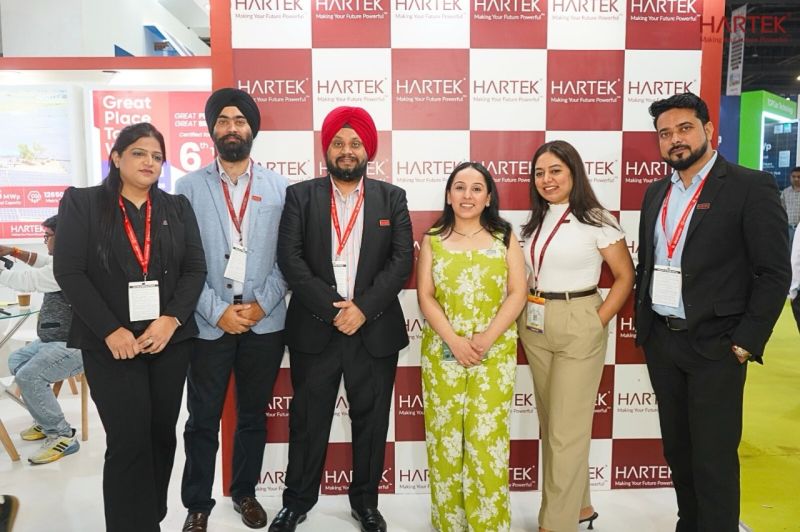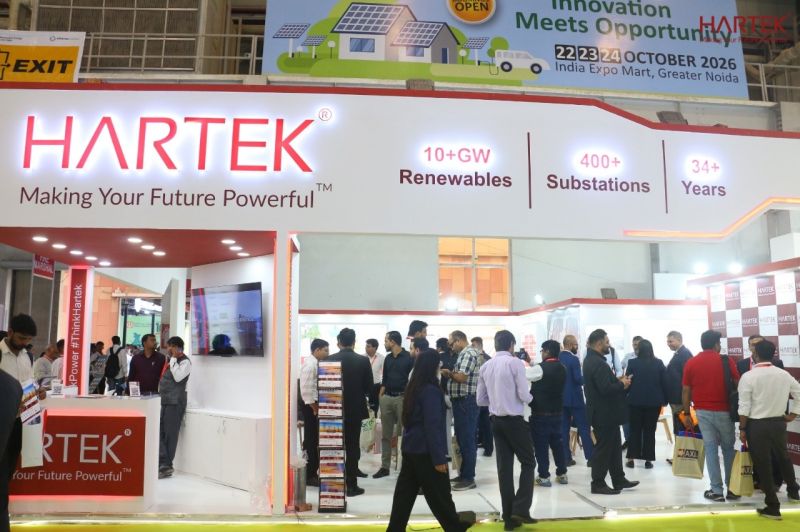To learn more about the event and its highlights, we invite you to check out the video below.
The renewable energy sector in India has been making significant strides over the past few years, and the excitement is set to reach its peak at the Renewable Energy India (REI) event.
Hartek, a leading renewable energy company in India, continues to contribute to the growth of renewable energy in India through its focus on clean energy solutions and its efforts to support the nation’s sustainable development goals.
The transformation of India from a power-deficit country to a global leader in renewable energy, with a total non-fossil fuel capacity now exceeding 250 GW and total renewable capacity reaching 247.3 GW (as of late 2025), has been remarkable. The country has set a goal to have 500 GW of electricity capacity from clean sources by 2030.
The impressive progress made by India as a result of the government’s bold initiatives, private sector participation, and technological innovation in renewable energy sources such as solar, wind, hydropower, and biomass has positioned the country as a frontrunner in the global clean energy transition.
India’s next phase of clean-energy growth will be mapped at the Renewable Energy India (REI) Expo 2025 which is going to be a celebration of these milestones.
Hartek, one of the leading EPCs in the renewable energy sector in India, is driving this shift through transformative renewable energy projects across the country. By participating in REI 2025, the company demonstrates its dedication to sustainability, decarbonisation, and nation-building. It continues to promote the use of clean energy and contributes significantly to India’s goal of achieving carbon neutrality by 2070.
REI Expo is more than just an exhibition; it is a comprehensive global platform that drives collaboration, innovation, and investment across the renewable energy ecosystem. Serving as a hub for knowledge exchange and business opportunities, the event provides a unique space for stakeholders to explore emerging technologies, sustainable solutions, and strategic partnerships. REI 2025, scheduled to be held at the India Expo Centre in Greater Noida, will bring together policymakers, business leaders, investors, and technology innovators from around the world to share insights, showcase advancements, and collectively accelerate the transition toward a cleaner, greener, and more sustainable energy future.
The theme of the current edition will be on fast developing technologies, refurbishing policies and establishing new forms of business that would accelerate the adoption of renewable energy within the nation. They will be discussing grid integration, energy storage, and green hydrogen, among other topics, which are crucial for India’s future sustainability.
For leading renewable energy companies like Hartek Group, REI 2025 is not only a platform to learn but also an opportunity to showcase cutting-edge engineering and intelligent grid solutions that power solar, wind, and hybrid projects.
The expansion of India’s energy that is clean comes from a diverse mix of sources all of which are renewable but each playing a different role in reducing carbon emissions and enhancing energy accessibility.

India has become one of the largest solar energy markets in the world, with installed capacity reaching approximately 130 GW by October 2025. The government’s promotion of rooftop solar, solar parks, and floating solar projects has brought solar power within the reach of not only urban but also rural consumers.
The innovations like bifacial panels, AI-based monitoring, and advanced inverters are coming up with efficient and more affordable solar energy, thereby putting India nearer to the goal of 280 GW of solar capacity by 2030.
Wind energy is still very essential in India’s renewable plan with an approximate capacity of 50 GW as of 2025. Gujarat, Tamil Nadu, and Maharashtra are still going strong and leading the wind installation initiatives, however, the latest technologies for turbines and the repowering of the old sites are helping in more power generation and cost reduction.
Hydropower and biomass have been helping India’s power grid to be stable as they are reliable energy sources that complement intermittent renewables like solar and wind. Moreover, the small hydro and biomass gasification projects are not only solving power problems but also creating employment in rural areas and encouraging decentralised energy access throughout the country.
HARTEK Group, one of India’s top three engineering, procurement, and construction (EPC) companies in the solar sector, has been playing a pivotal role in integrating renewable energy into the national grid. With over 10 GW of solar grid connectivity and expertise in developing substations of up to 765 kV, HARTEK continues to drive large-scale clean energy transformation. The company recently commissioned a 300 MW solar project, reaffirming its position as a leader in sustainable infrastructure. Leveraging its deep expertise in power systems, smart grids, and distributed energy, HARTEK ensures that renewable energy remains reliable, scalable, and economically viable. Its participation in REI 2025 will showcase innovative solutions aligned with India’s Net Zero goals and the government’s National Green Hydrogen Mission.
The public-sector programs are what act as the spine of India’s turnaround of renewables. Essential programs are:
With these initiatives, a robust policy and financial foundation has been established for the sector, bolstered by a record FDI inflow of $3.4 billion in the first three quarters of FY 2024–25, contributing to a cumulative total of $12.67 billion since April 2020.
At REI 2025, it will be the time and place for such people to discuss the best ways to implement their plans quickly and get the private-sector involved more.
The future of renewable energy in India is hinged on the progressive ideas, partnership, and wise investment. The major issues that will set the stage for next phase are:
REI 2025 will be the perfect place to meet, talk about, and sign deals for these technologies, which will lead India to a sustainable and self-reliant energy future.

The term renewables was at one time just a buzzword until it became a nationwide mission in India. Such events like REI 2025, apart from marking India’s achievements, also bring forward the new wave of innovation and of investment.
As renewable energy companies such as HARTEK Group continue to lead by example, India’s clean-energy journey will stand as a model for the world.
India’s commitment is clear, to power its future responsibly, efficiently, and inclusively. The stage is set, and the world is watching: Renewable Energy in India is truly taking centre stage at REI 2025.
1. What is REI 2025?
REI 2025 means the Renewable Energy India Expo 2025, which is one of the largest renewable energy expos in Asia, and it facilitates interaction between global stakeholders in order to promote clean energy technologies and collaborations.
The use of renewable resources allows India to lessen the need for fossil fuels, mitigate carbon emissions, assure energy security, and propel economic growth and rural development.
The primary sources of renewable energy are solar, wind, hydropower, and biomass. Out of these two, solar and wind are the quickest to grow.
They do it by implementing various schemes like PLI for solar manufacturing, the National Green Hydrogen Mission, and PM-KUSUM along with providing fiscal incentives and imposing renewable purchase obligations.
The company provides EPC, grid connectivity, and smart infrastructure solutions to support solar and other renewable energy projects across India. Through these efforts, it plays a key role in enabling the nation’s clean energy transition.